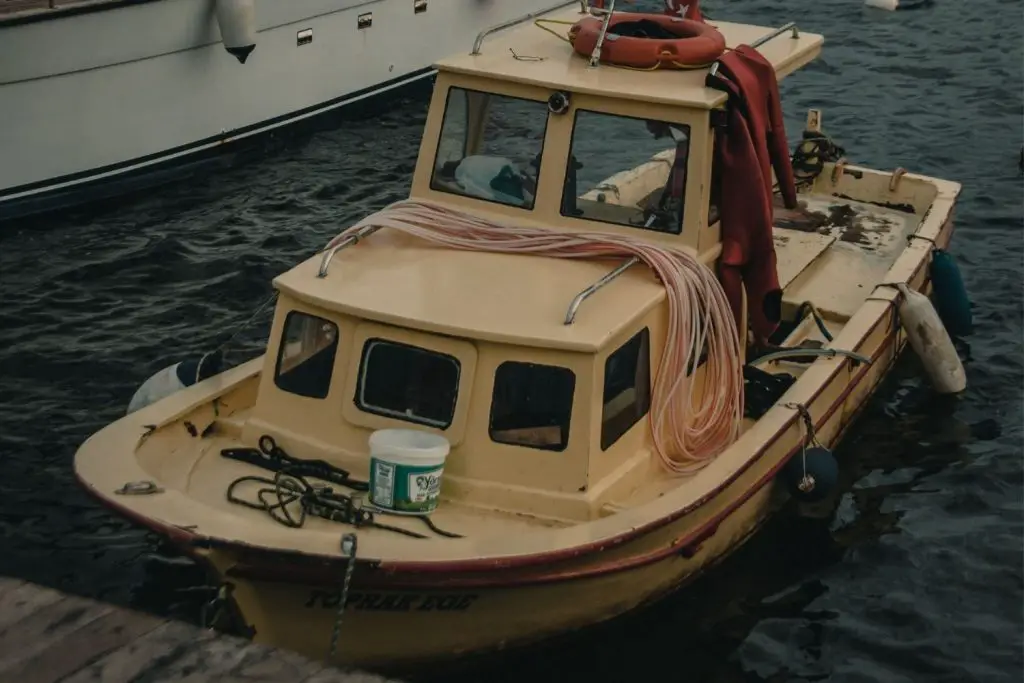We may get commissions for purchases made through links in this post. Thanks for the support! 👍
If you’re a boat owner, there’s a good chance that you’ve heard of fiberglass. This material is often used in boat construction because it is strong and durable. But what happens if your boat isn’t being used and it’s just sitting in your driveway or dock? Will the fiberglass go bad if left outside? In this article, we will explore the answer to that question.
You do not have to worry about the fiberglass on your boat when left outside. It is one of the best materials possible for a watercraft that sees so many harsh elements and usage over the year. You are even able to leave them outside untouched for years at a time and know that you can use them again without worrying about the structure of the boat.

What Is Fiberglass, And What Are Its Properties?
Fiberglass is a composite material that is made up of tiny glass fibers. It was first developed in the early 20th century, and it has been used in boat construction for many years.
Fiberglass is strong and durable, and it can withstand a lot of wear and tear. It also doesn’t corrode or rust, so it is often used in marine applications. Fiberglass boats are lightweight and easy to maneuver, making them popular for pleasure craft.
And because fiberglass is a poor conductor of heat, it helps keep the interior of a boat cool in hot weather.
However, fiberglass can be brittle and difficult to repair if damaged. Nonetheless, fiberglass remains a popular choice for boat builders due to its many benefits.
The Benefits of Using Fiberglass In Boat Construction
There are several reasons why fiberglass is a popular choice for boat construction. Some of the benefits include:
1. Strength of the material
Fiberglass is strong and durable, and it can withstand a lot of wear and tear. This is especially great for boats where you may need to moor your watercraft on beaches with gravel and rock. It is also great for people that like to take their boats into shallow water, where there is a risk of hitting things.
2. Fiberglass is very durable
Fiberglass does not corrode or rust, making it ideal for marine applications. When you are around water constantly (especially salt water), most other applications that are strong enough will quickly run into issues, whereas fiberglass will not.
3. Weight is low
Fiberglass is lightweight, which makes it easy to maneuver. When you need to be able to be buoyant and easy to turn in small watercraft, fiberglass is one of the best options on the market today.
4. Ease of repair
If fiberglass is damaged, it can often be repaired relatively easily. Unlike many other types of materials, fiberglass is one of the few things that can be repaired at home. Just make sure to do your homework before attempting to DIY repairs on your boat.
5. Heat Resistance
Fiberglass is a poor conductor of heat, which helps keep the interior of a boat cool in hot weather. This also means that the heat from the engine will not warp or damage any of the structural components of your boat.
6. Brittle Strength
Although fiberglass can be brittle, it is still stronger than other materials such as wood.
What are the downsides of fiberglass?
Although fiberglass has many benefits, it also has a few drawbacks. Some of the downsides include:
- Brittle – Fiberglass can be brittle and break easily if not handled properly.
- Toxic – Fiberglass is made of tiny glass fibers, which can be harmful if inhaled.
How Does Fiberglass React To Uv Radiation And Weathering Agents?
Fiberglass is a material made from glass fibers that have been woven together. It is commonly used in the manufacturing of boats, automobiles, and aircraft. It is also used in the construction of buildings and homes.
Fiberglass is prized for its strength and durability. However, it is also susceptible to UV radiation and weathering agents damage. UV radiation can break down the bonds between the glass fibers, weakening the material.
Weathering agents such as rain, snow, and ice can also cause damage to fiberglass.
Over time, this damage can lead to cracks, chips, and other forms of wear and tear. As a result, it is important to protect fiberglass from UV radiation and weathering agents.
This can be done by using a UV protector or coating and keeping the boat covered when it is not in use.
- 5 Best Ways to Get Moisture Out of Your Boat
- Why do people use “SS” in their boat names?
- Will Boat Floors Rot? How to Prevent this from Happening
So, Will Boat Fiberglass Go Bad If Left Outside?
The answer to this question is no. Boat fiberglass will not go bad if left outside. It will last for many years without any problems. So, if you’re not using your boat and want to store it somewhere, you can rest assured that the fiberglass will be just fine.
While boat fiberglass will not go bad if left outside, there are a few potential downsides to leaving it outdoors for an extended period.
First, the sun can cause fiberglass to fade over time.
Second, rain and other weathering agents can cause the fiberglass to deteriorate eventually.
So, while leaving your boat fiberglass outside will not cause any major problems, it’s still a good idea to keep it protected from the sun and rain as much as possible.

Recommendations For Keeping Your Fiberglass Boat Looking Good For Years To Come
If you want to keep your fiberglass boat looking good for years to come, there are a few things that you can do:
- Use a UV protector or coating (like this right here) when the boat is not in use. This will help to protect the fiberglass from the sun’s damaging rays.
- Keep the boat covered (with a good boat cover like this) when it’s not in use. This will help to protect it from the rain and other weathering agents.
- Keep an eye on any damage and repair it as soon as possible.
By following these simple tips, you can keep your fiberglass boat looking good for years to come. These tips will help to ensure that your boat retains its value and remains an enjoyable part of your life for years to come.
Conclusion
Boat fiberglass will not go bad if left outside. However, there are a few things that you can do to protect it from the sun and weathering agents. Follow these simple tips, and you can keep your fiberglass boat looking good for years to come. Thanks for reading!


